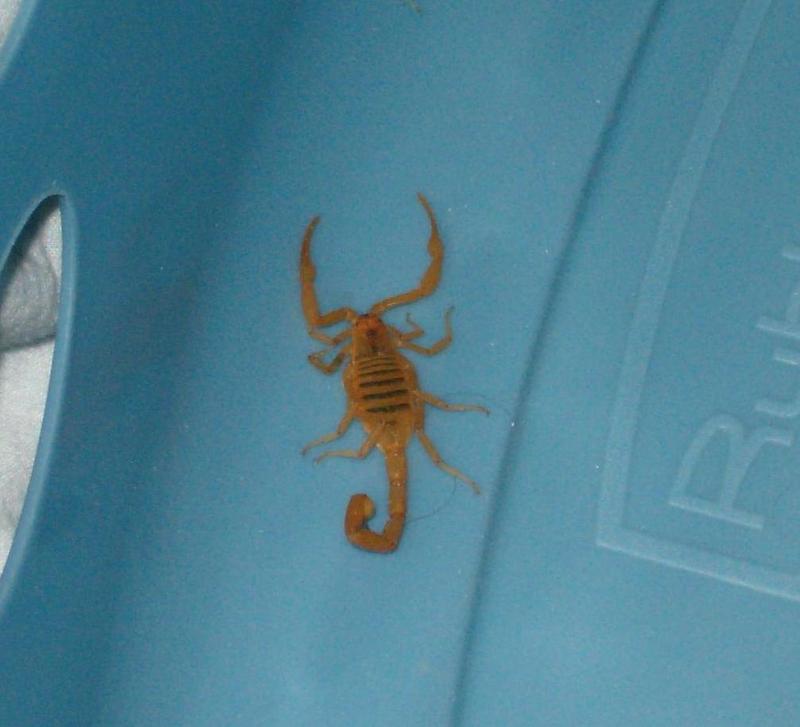|
| 질의: Centruroides exilicauda | 결과: 1번째/1 | |
Arizona bark scorpion (Centruroides exilicauda) - Wiki
| 제목: | Arizona bark scorpion (Centruroides exilicauda) - Wiki
| |

| 해상도: 1007x915
파일크기: 71130 Bytes
등록시간: 2006:12:14 23:02:25
|
Arizona bark scorpion
From Wikipedia, the free encyclopedia
[Photo] This is a picture of an Arizona Bark Scorpion that was found early one morning in the bottom of a laundry basket. It was found in January 2006 in Chandler, Arizona.
The Arizona bark scorpion (Centruroides exilicauda, previously known as Centruroides sculpturatus), is a small (7 cm) light brown scorpion common to the southwest United States. It is venomous, and its sting has been known to be lethal, particularly for small children. An antivenom was developed for this species, and produced in quantities sufficient to treat individuals within the state of Arizona. Production of this antivenom has since ceased, and a Mexican antivenin is being tested in its place. Fatalities are rare, with two recorded in the state of Arizona since 1968.
The bark scorpion is unusual in that it is the only species in the southwest that regularly climbs walls, trees, and other objects with a sufficiently rough surface. It is not capable of climbing glass or smooth plastic, so it may be safely contained in glass vessels without lids. It is one of two species within the United States that is dangerous; the other, far less dangerous, species is Centruroides vittatus.
Arizona bark scorpions are not true desert species; they prefer riparian areas, with sufficient moisture and humidity to support insects and other prey species. However, the popularity of irrigated lawns in residential areas has led to an explosion in the number of these animals in some areas. The availability of moisture seems important in the life cycle of the species. Females will not give live birth if kept too dry, and babies seem susceptible to drying out and dying up to the first or second instar.
Care and feeding is similar to that of other scorpions. The Arizona bark scorpion does prefer to hide, and will cling to all but the smoothest of surfaces. It is more active at night, and a diet of crickets and other insects suits them well. Due to the venomous nature of the species, handling is unwise. They are generally not aggressive, and prefer to run or hide when confronted. The sting is very painful, and may cause pain and temporary loss of use of an affected limb. Envenomation is described as being "electrical" by those who have been stung, and the site of the sting may produce this sensation upon palpation. In extreme cases, allergic reactions may cause death. Injury to young children or the elderly may require medical intervention.
Individual scorpions may live to 5-6 years, and possibly more.
http://en.wikipedia.org/wiki/Arizona_bark_scorpion
| The text in this page is based on the copyrighted Wikipedia article shown in above URL. It is used under the GNU Free Documentation License. You may redistribute it, verbatim or modified, providing that you comply with the terms of the GFDL. |
|
 |
 |
 |
Centruroides exilicauda
1/1 |
 |
 |
^o^
동물그림창고 똑똑전화 누리집
^o^
|
|